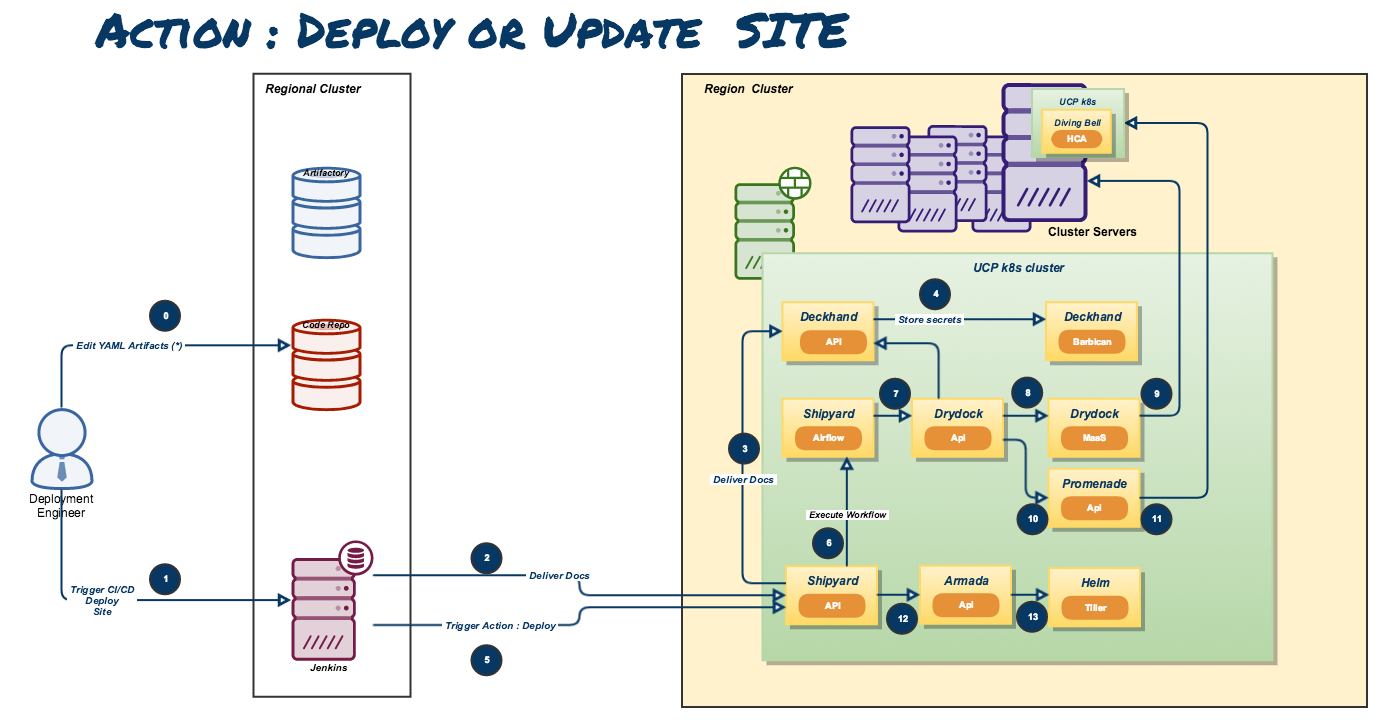The guide describes how to apply changes on already running cluster. Describe the flow, from config change to deployment start. Change-Id: I6be24794d570ca6b42db36f2a10b065b8e16f428
7.9 KiB
Airship Treasuremap
Airship is a collection of components that coordinate to form means of configuring and deploying and maintaining a Kubernetes environment using a declarative set of yaml documents.
More specifically, the current focus of this project is the implementation of OpenStack on Kubernetes (OOK).
Component Projects
Pegleg
Pegleg is a document aggregator that provides early linting and validations via Deckhand, a document management micro-service within Airship.
Shipyard
Shipyard is the directed acyclic graph controller for Kubernetes and OpenStack control plane life cycle management.
Shipyard provides the entrypoint for the following aspects of the control plane:
Designs and Secrets
Site designs, including the configuration of bare metal host nodes, network design, operating systems, Kubernetes nodes, Armada manifests, Helm charts, and any other descriptors that define the build out of a group of servers enter the Airship via Shipyard. Secrets, such as passwords and certificates, use the same mechanism. The designs and secrets are stored in Airship's Deckhand, providing for version history and secure storage among other document-based conveniences.
Actions
Interaction with the site's control plane is done via invocation of actions in Shipyard. Each action is backed by a workflow implemented as a directed acyclic graph (DAG) that runs using Apache Airflow. Shipyard provides a mechanism to monitor and control the execution of the workflow.
Drydock
Drydock is a provisioning orchestrator for baremetal servers that translates a YAML-based declaritive site topology into a physical undercloud that can be used for building out a enterprise Kubernetes cluster. It uses plugins to leverage existing provisioning systems to build the servers allowing integration with the provisioning system that best fits the goals and environment of a site.
Capabilities
- Initial IPMI configuration for PXE booting new servers.
- Support for Canonical MAAS provisioning.
- Configuration of complex network topologies including bonding, tagged VLANs and static routes
- Support for running behind a corporate proxy
- Extensible boot action system for placing files and SystemD units on nodes for post-deployment execution
- Supports Keystone-based authentication and authorization
Deckhand
Deckhand is a document-based configuration storage service built with auditability and validation in mind.
Core Responsibilities
- layering - helps reduce duplication in configuration by applying the notion of inheritance to documents
- substitution - provides separation between secret data and other configuration data for security purposes and reduces data duplication by allowing common data to be defined once and substituted elsewhere dynamically
- revision history - maintains well-defined collections of documents within immutable revisions that are meant to operate together, while providing the ability to rollback to previous revisions
- validation - allows services to implement and register different kinds of validations and report errors
- secret management - leverages existing OpenStack APIs -- namely Barbican -- to reliably and securely store sensitive data
Armada
Armada is a tool for managing multiple Helm charts with dependencies by centralizing all configurations in a single Armada YAML and providing life-cycle hooks for all Helm releases.
Core Responsibilities
- Multiple Chart Deployments and Upgrades driven by Armada Manifests
- Manage multiple chart dependencies using Chart Groups
- Enhancing base Helm functionality
- Supports Keystone-based authentication and authorization
Kubernetes
Kubernetes is an open source system for managing containerized applications across multiple hosts, providing basic mechanisms for deployment, maintenance, and scaling of applications.
Promenade
Promenade is a tool for bootstrapping a resilient, self-hosted Kubernetes cluster and managing its life-cycle.
Bootstrapping begins by provisioning a single-node cluster with a complete, configurable Airship infrastructure. After hosts are added to the cluster, the original bootstrapping node can be re-provisioned to avoid subtle differences that could result in future issues.
Promenade provides cluster resiliency against both node failures and full cluster restarts. It does so by leveraging Helm charts to manage core Kubernetes assets directly on each host, to ensure their availability.
Helm
Helm is a package manager for Kubernetes. It helps you define, install, and upgrade even the most complex Kubernetes applications using Helm charts.
A chart is a collection of files that describe a related set of Kubernetes resources. Helm wraps up each chart's deployment into a concrete release, a tidy little box that is a collection of all the Kubernetes resources that compose that service, and so you can interact with a collection of Kubernetes resources that compose a release as a single unit, either to install, upgrade, or remove.
At its core, the value that Helm brings to the table -- at least for us -- is allowing us to templatize our experience with Kubernetes resources, providing a standard interface for operators or high-level software orchestrators to control the installation and life cycle of Kubernetes applications.
OpenStack-Helm
The OpenStack-Helm project provides a framework to enable the deployment, maintenance, and upgrading of loosely coupled OpenStack services and their dependencies individually or as part of complex environments.
OpenStack-Helm is essentially a marriage of Kubernetes, Helm, and OpenStack, and seeks to create Helm charts for each OpenStack service. These Helm charts provide complete life cycle management for these OpenStack services.
Users of OpenStack-Helm either deploy all or individual OpenStack components along with their required dependencies. It heavily borrows concepts from Stackanetes and complex Helm application deployments. Ideally, at the end of the day, this project is meant to be a collaborative project that brings OpenStack applications into a cloud-native model.
Divingbell
Divingbell is a lightweight solution for:
- Bare metal configuration management for a few very targeted use cases
- Bare metal package manager orchestration
What problems does it solve?
The needs identified for Divingbell were:
- To plug gaps in day 1 tools (e.g., Drydock) for node configuration
- To provide a day 2 solution for managing these configurations going forward
- [Future] To provide a day 2 solution for system level host patching
Berth
Berth is a deliberately minimalist VM runner for Kubernetes.
Process Flows
authoring_and_deployment config_update_guide troubleshooting_guide seaworthy airskiff airsloop


